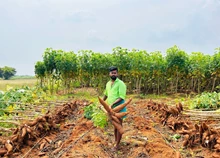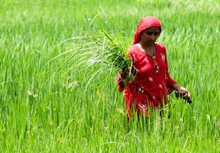
Carbon sequestration is a critical process aimed at mitigating the impact of climate change and global warming. It involves capturing and storing carbon dioxide (CO2) in various forms such as soil, vegetation, and underground reservoirs.
The primary objective of carbon sequestration is to reduce the amount of CO2 in the atmosphere, which is a significant contributor to global warming.
Agricultural soils are a significant source of carbon sequestration, but human activities have led to the loss of soil organic carbon (SOC) in these soils. According to a technical review by the Indian Council for Agricultural Research (ICAR), agricultural soils have lost between 30-75% of their inherent SOC pool, which is a cause for concern.
To mitigate the effects of climate change, experts have stressed the importance of carbon sequestration, besides imparting sustainability to productivity. The ICAR recommends that a combination of good crop production practices, resource conservation measures, agroforestry, and forest and grassland management can enhance carbon sequestration and its long-term stability and sustainability.
Some of the management practices suggested by the ICAR include conservation tillage, cover crops, intercropping, residue retention, organic manures, erosion control, multi-tier cropping, agroforestry, and crop and tree biomass recycling. These practices can help in the stable assimilation of soil organic carbon for a long period.
The United Nations’ Intergovernmental Panel on Climate Change (IPCC) states that to contain global warming at 1.5 degrees Celsius, the world needs to reduce global net man-made CO2 emissions by 45% by 2030 and reach net zero by 2050. Land use type is a crucial factor in controlling organic matter present in soils, and agricultural land use can alter the total quantity of soil organic matter and its protective processes.
Carbon sequestration is a crucial strategy to address the impacts of climate change and improve food security. Agricultural lands play a significant role in carbon sequestration, and the adoption of recommended management practices can help in enhancing carbon sequestration and its sustainability.
It is important for policymakers, farmers, and individuals to understand the significance of carbon sequestration and take action to reduce CO2 emissions and store more carbon in the soil.











